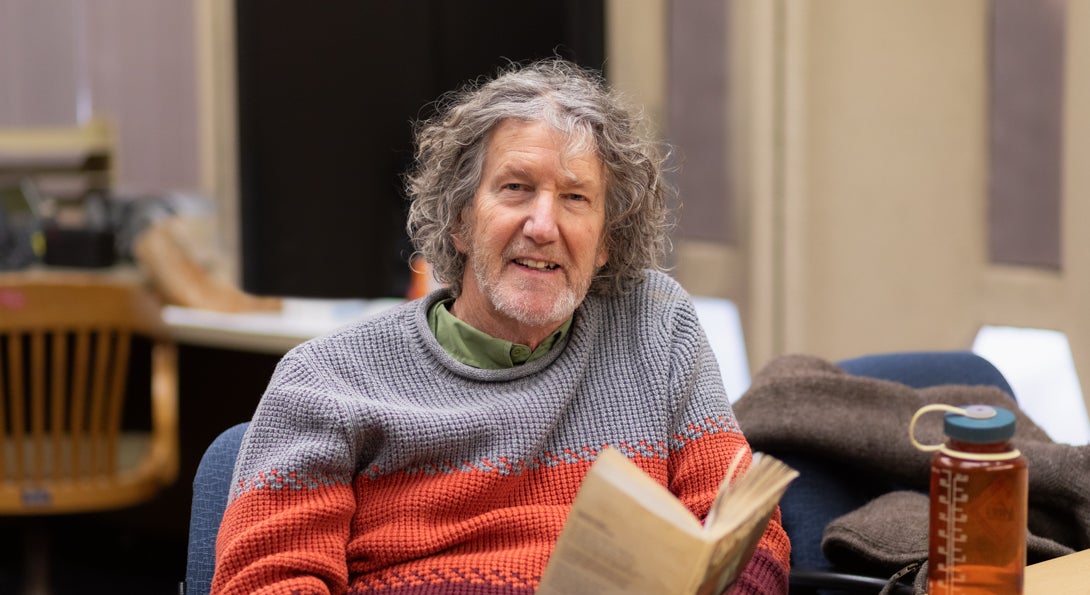English Professor Champions Storytelling and Inclusion at UIC

Inspired by the legacy of Jane Addams, Dave Schaafsma weaves research, teaching, and community to reshape English education in the College of Liberal Arts & Sciences.
Interview with David Schaafsma
Name: Dave Schaafsma
Title: Professor of English and Director, Program in English Education
Department: English
Tell us a bit about your history at UIC and in our English Department. What has been your favorite accomplishment in your time here?
I came to UIC in 1999 from Teachers College, Columbia University. Since coming here I published my edited collection, Jane Addams in the Classroom and Growing Up Chicago, co-edited with Roxanne Pilat and Lauren DeJulio Bell, but two things that I am most proud of here that we have accomplished together is 1) the amazing growth in 25 years of Latinx and other key student populations; when I came here we set that as a goal to increase the diversity of the program, and we grew from 5% Latinx (mostly Hispanic) to close to 40%! Also, a steady increase of Arab/Muslim, and a small increase in black students; 2) putting together our awesome program faculty—Todd DeStigter, Kate Sjostrom, Abby Kindelsperger, Lauren Johnson–that has emerged as the leading program in English education in the area, in my humble opinion. It’s deeply satisfying for us to work hard to prepare students to become readers, writers, and teachers!
How did you originally become interested in the field of English?
I was always a reader and writer of stories, my favorite subject in high school was definitely English, but when I came to college I began as an Elementary Education major because I had tutored a second grader for my high school History class. But my Novels teacher urged me to switch to English, and then I transitioned to teaching English. Since then I got an MFA in Creative Writing, a PhD in English and Education, and now teach courses more in literature than my own program as I transition toward retirement.
How does research factor into your role as a faculty member at LAS?
For most of the 35 years of my work in English Education I researched about students and teachers in urban classrooms. The focus of that research was (and remains) the function of narrative/storytelling in the process of teaching and learning and citizenship in such works as Eating on the Street: Teaching and Learning in a Multicultural Society, Jane Addams in the Classroom and Growing up Chicago (co-edited with Roxanne Pilat and Lauren DeJulio Bell). These projects began with a question, out of curiosity, developed into a passion, which led me to hours and then weeks and then years of research and writing.
You mention that your research projects in urban classrooms began with a question. What was that question?
I begin any project with a question I have about that project, such as how did Jane Addams model for us how to live and work in a community to try to improve the lives of those living there, and how can teachers follow that model in their own classrooms? Then more answers than I anticipated come into play, which is to say I learn how the situation is more complex than I ever thought.
For instance, people in the neighborhood thought that a “devil baby” was being harbored in the house, and huge crowds came demanding to see it. This took place over several days, and got reported in the press, with many people—including her esteemed friend and U of Chicago philosopher John Dewey—dismissing these views as “primitive” and ridiculous superstition. But Addams listened to several people in the community, listening to their beliefs that were sometimes grounded in folklore and fears, and she never disrespected anyone she listened to. In an essay about the incident, she taught her readers about the power of listening to stories, working with her neighbors and not just doing charity work for them. That principle of teaching as listening I and other readers took away from our work.
Is there anything in your research that has surprised you?
All research, done well, surprises. To anticipate an answer to your question, to have it merely confirm what you imagined would happen, rarely happens. My former colleague Bill Ayers says; lean into the question. Be ready to see you were wrong.
One example of that for me happened in my research into Jane Addams. Initially I had thought she was primarily a fierce maker of arguments, which she truly was, from the time she was in school, as she was a fine public orator. I knew her as a feminist, a social activist, a person of sharp political savvy. But what I saw as I looked into her writings and her work here at the Hull-House is that she was primarily a listener, who communicated with others primarily through an exchange of stories. Her best writing was stories about her experiences in this community, much of it gathered from her neighbors. She eschewed ideological pigeonholes and listened to everyone, including the corporate bosses and political leaders in Chicago. I learned that and it shaped my research and my perspective on her, and moreover, shaped my own approach to knowledge and teaching.
Do you have any advice for students pursuing an English degree?
Read widely and deeply. Read everything. At this point, having taught now for five decades (!!), I can say I have taught everything–Shakespeare, Postwar American Novels, The Teaching of Writing, Young Adult Literature, Detective Fiction, Ghost Stories—but whatever you read can take you into the mysteries of life and language, a process that continues to give me joy. And satisfaction: We live in a time of disinformation, lies. Knowing all narrators are unreliable to some extent is useful as we read, and write, and engage the world.